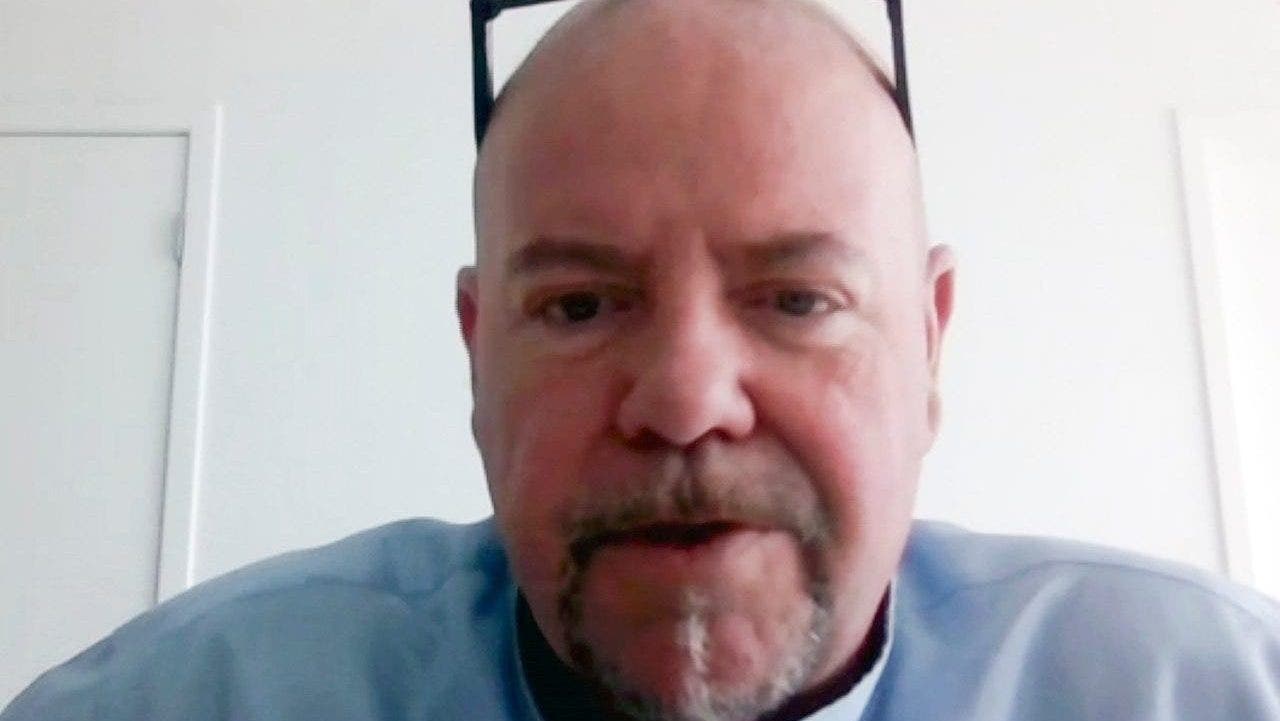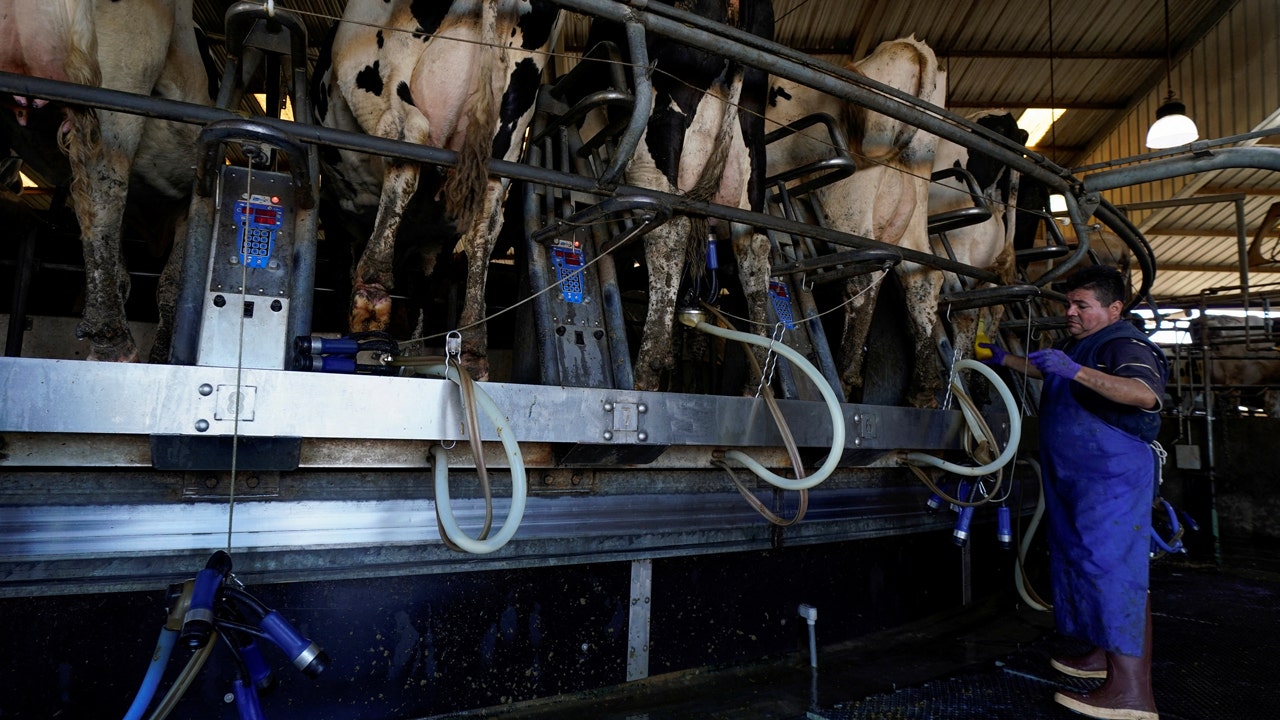New Jersey
Stomping Grounds: NJ-8 Debate, the race for Payne's seat; and votes on Speaker Mike Johnson – New Jersey Globe

New Jerseyans aren’t always civil, but it’s still possible for a liberal Democrat and a conservative Republican to have a rational and pleasant conversation about politics in the state. Dan Bryan is a former senior advisor to Gov. Phil Murphy and is now the owner of his own public affairs firm, and Alex Wilkes is an attorney and former executive director of America Rising PAC who advises Republican candidates in New Jersey and across the nation, including the New Jersey GOP. She is currently the campaign manager for Curtis Bashaw’s U.S. Senate race. Dan and Alex are both experienced strategists who are currently in the room where high-level decisions are made. They will get together weekly with New Jersey Globe editor David Wildstein to discuss politics and issues.
How did Rob Menendez and Ravi Bhalla do in their first NJ-8 congressional debate? Will Menendez’s bid to deflect connections to his father and cast Bhalla as an unethical candidate work?
Alex Wilkes: I’m sorry, I can’t help it, I have a lot of style notes, and they’re probably a lot more useful than what you think about what I think about two guys talking about who can tax us more.
For one, campaign staffers, please take the time to test your candidate’s audio beforehand. Test it, record it, play it back. Mayor Bhalla sounded like he was on Skype in 2007. You might argue that it’s the substance that matters, but if voters can’t hear you, what good does it do?! Simple USB microphones don’t cost a lot, but they help tremendously.
I agree with Dan (below) that I thought that Menendez’ decision was a good one. It showed energy and vigor in a debate where he was expected to be on the defensive. My only advice would be to put something below him, out of the camera frame, like a stack of boxes or a music stand to rest the candidate’s hands on so he doesn’t move so wildly outside of the normal confinements of a desk. You learn the hard way that little movements look much more exaggerated on camera than in person.
For Zoom appearances like this, it’s important to make sure that your camera is at eye level. For much of the debate, Menendez was looking down, which sometimes gave the appearance that he was (gasp!) reading from notes. My God. Don’t be afraid to put that iPad on an adjustable tripod and use a sticky note arrow to keep your eye focused on that tiny camera. (Unless, of course, you’re actually just reading from notes.)
Anoter thing: active listening. Especially if you’re going to do something unorthodox like stand for a Zoom, you need to be careful about prolonged glances off to the side. It can be very hard to learn a “neutral” face for debates and television appearances, but every effort should be made to not look bored, overly eager, or angry.
Thank you for coming to my Ted Talk.
Dan Bryan: I think Rob Menendez did everything he could in this debate. He deflected the attacks on him the best he could, and pivoted back to the attack on his opponent and to his positive messaging. This was a tough spot for him, and I think he did as much as he could with it.
But let’s also be fair to Mayor Bhalla – he went in with one goal, and I think he achieved it. At every turn, he worked to tie Congressman Menendez to his father, not allowing the actions of Senator Menendez is accused of to recede into the background. With the Senator’s trial about to start, it’s hard to find fault in his strategy.
On a mechanical note, I thought it was very smart for Congressman Menendez to stand throughout the debate. Personally, I miss in-person debates – there is so much less life over Zoom, though I understand why it’s necessary. So good on him and his team for finding a way to bring some energy and dynamism to a difficult format.
The race for Donald Payne’s 10th district seat seems to be taking shape, with eleven Democrats preparing to run before today’s filing deadline. What’s your early take on the campaign? Since there’s only one office on the ballot, lines clearly don’t matter since there are none, but is this an early way of showing a party organization’s strength without a line?
Dan: I have always been a skeptic of the true strength of the line. To me, the power of the lines emanated from the perceived power of the lines – in other words, people didn’t challenge the line because they thought it was impossible, not because it was impossible.
In my opinion, the power of organizational strength always emanated from the quality of the organizations themselves, not from ballot design. Every political party, whether local, county, or statewide, should look at the upcoming primaries as an opportunity to prove their organizing strength. Above all, of course, the quality of the candidate matters.
I believe that Newark Council President Lamonica McIver is a fantastic candidate. She has already accomplished so much in her short career, and as a young mother of color, she represents a community desperately underrepresented in DC. Kudos to Chairman Jones for backing a fantastic candidate.
Alex: I can’t say that I have been following this race all that closely, but from my bird’s eye view from the other party, I think we are seeing some of the inevitable dynamics of a post-line world.
The line system (and I don’t disagree, by the way, with my friend, Dan, about the value of strong party organizations) did seem to favor “the next in line,” who was usually an old guy who had been around long enough to call in his chits. I think this was especially true in deeply-entrenched partisan parts of the state.
With that now gone, it looks like some opportunities are opening up for some more diversity in the candidate selection. And by diversity, I mean real diversity – not performative, box-checking “DEI.” Let’s face it, a nearly all male, older congressional delegation is not all that representative of the demographics of the party – or even the county committees, for that matter. I’m interested to see where it goes!
Bonnie Watson Coleman voted against quashing Marjorie Taylor Greene’s bid to oust House Speaker Mike Johnson (so did Rob Menendez; the other six Democrats sided with Republicans), saying it wasn’t her job to save Johnson’s job, and the Speaker she really wants is Hakeem Jeffries. Is she right?
Dan: The only bright spot in DC these days is the continued inability for Congressional Republicans to tie their shoes. They govern like the Sideshow Bob GIF, constantly stepping on rake after rake, with no end in sight.
I’ll do what political pundits aren’t allowed to do, and admit that I see both sides of this one. In defense of Congresswoman Watson Coleman and Congressman Menendez, why should they be tasked with saving Republicans from themselves? If they are in chaos, let the American people see it and judge them for it. If that means Congress can’t function, well, it’s not functioning all that well as is, and elections have consequences.
But in fairness to Minority Leader Jeffries and the rest of our New Jersey delegation, at some point we do need to guard against that chaos. I’m no fan of Mike Johnson, but I’m not sure what Democrats gain by allowing him to be thrown overboard. And if they can negotiate something for themselves in return, all the better.
Alex: The reality is that when you’re dealing with thin margins and a polarized society, each party is vulnerable to their extremes challenging the leadership in the House. Democrats can wax nostalgic for the days of Nancy Pelosi, but even she was facing threats from the left wing towards the end and granted rules concessions accordingly.
As the minority party, Democrats certainly have the choice not to “save” a mainstream Republican Speaker, but I think they saw the consequences of doing that last time: Gottheimer’s self-important “Problem Solvers’ Caucus” imploded, critical funding bills stalled. No one looked good coming out of that mess, and I think most Democrats learned their lesson.

New Jersey
Severe Weather Headed To NJ: See Timeline

NEW JERSEY — Multiple rounds of severe storms are set to slam New Jersey Thursday, complete with damaging winds, heavy rain and hail, forecasters said.
The first round will be an “organized cluster” impacting regions along and northwest of I-95 through about noon as daytime high temperatures reach near 80 degrees, the National Weather Service said. The second round (composed of scattered storms) will hit the state this afternoon and evening, this time impacting areas mostly along and southeast of I-95.
Gusty winds up to 65 mph and hail will be possible during severe storms, the weather service said. The entire state is under a “marginal” risk for severe storms, according to graphics provided by the weather service.
Find out what’s happening in Across New Jerseywith free, real-time updates from Patch.
Isolated tornadoes and flooding aren’t off the table for the hardest-hit regions, AccuWeather added, noting evening commuters should prepare for delays and disruptions.
As of 9:15 a.m., 11 New Jersey counties are under a severe thunderstorm warning through 9:45 a.m.
Find out what’s happening in Across New Jerseywith free, real-time updates from Patch.
The effected counties are:
- Hunterdon
- Morris
- Sussex
- Warren
- Somerset
- Middlesex
- Passaic
- Union
- Bergen
- Essex
- Hudson
“60 mph wind gusts and penny size hail,” the National Weather Service said of the warning. “Damage to roofs, siding, trees, and power lines is possible.”
Additional showers and perhaps thunder will be possible — especially in South Jersey — late Friday into Saturday, the National Weather Service added.
Here’s the latest forecast, according to the National Weather Service:
North Jersey
Thursday: Showers and thunderstorms likely, mainly before 11 a.m. Mostly cloudy, with a high near 78. West wind around 5 mph. Chance of precipitation is 70 percent. New rainfall amounts between a quarter and half of an inch possible.
Thursday Night: A slight chance of showers and thunderstorms before 11 p.m., then a slight chance of showers after 5 a.m. Partly cloudy, with a low around 60. West wind around 5 mph becoming north after midnight. Chance of precipitation is 20 percent.
Friday: Sunny, with a high near 80. West wind around 5 mph.
Friday Night: Mostly clear, with a low around 56. West wind around 5 mph becoming calm.
Saturday: A slight chance of showers between 2 and 5 p.m., then a slight chance of showers and thunderstorms after 5pm. Mostly sunny, with a high near 79. Calm wind becoming south around 5 mph in the afternoon. Chance of precipitation is 20 percent.
Saturday Night: A chance of showers and thunderstorms before 11 p.m., then a chance of showers between 11 p.m. and 2 a.m. Patchy fog after 5 a.m. Otherwise, mostly cloudy, with a low around 59. Chance of precipitation is 30 percent. New precipitation amounts of less than a tenth of an inch, except higher amounts possible in thunderstorms.
Central Jersey
Thursday: Showers and thunderstorms likely, mainly before 2 p.m. Mostly cloudy, with a high near 84. Southwest wind 5 to 10 mph. Chance of precipitation is 60 percent. New rainfall amounts between a tenth and quarter of an inch, except higher amounts possible in thunderstorms.
Thursday Night: A chance of showers and thunderstorms, mainly after 8 p.m. Mostly cloudy, with a low around 64. Southwest wind around 5 mph. Chance of precipitation is 30 percent. New rainfall amounts of less than a tenth of an inch, except higher amounts possible in thunderstorms.
Friday: A slight chance of showers before 11 a.m. Mostly cloudy, then gradually becoming sunny, with a high near 84. North wind around 5 mph becoming west in the afternoon. Chance of precipitation is 20 percent.
Friday Night: Mostly clear, with a low around 60. West wind around 5 mph becoming calm in the evening.
Saturday: A slight chance of showers after 2 p.m. Partly sunny, with a high near 82. Light and variable wind becoming southeast 5 to 10 mph in the afternoon. Chance of precipitation is 20 percent.
Saturday Night: A chance of showers and thunderstorms before 11 p.m., then a chance of showers between 11 p.m. and 2 a.m., then a slight chance of showers and thunderstorms after 2 a.m. Patchy fog after 4 a.m. Otherwise, mostly cloudy, with a low around 61. Chance of precipitation is 30 percent. New rainfall amounts of less than a tenth of an inch, except higher amounts possible in thunderstorms.
South Jersey
Thursday: A chance of showers and thunderstorms. Mostly cloudy, with a high near 82. Southwest wind 5 to 10 mph. Chance of precipitation is 50 percent. New rainfall amounts of less than a tenth of an inch, except higher amounts possible in thunderstorms.
Thursday Night: A chance of showers and thunderstorms. Mostly cloudy, with a low around 64. South wind around 5 mph becoming calm. Chance of precipitation is 40 percent. New rainfall amounts of less than a tenth of an inch, except higher amounts possible in thunderstorms.
Friday: A chance of showers, mainly before 11 a.m. Mostly cloudy, then gradually becoming sunny, with a high near 83. Northwest wind around 5 mph. Chance of precipitation is 30 percent. New precipitation amounts of less than a tenth of an inch possible.
Friday Night: Patchy fog after 2 a.m. Otherwise, partly cloudy, with a low around 59. Southwest wind around 5 mph becoming calm.
Saturday: A chance of showers, mainly after 5 p.m. Partly sunny, with a high near 79. Light east wind becoming southeast 5 to 10 mph in the afternoon. Chance of precipitation is 30 percent. New
precipitation amounts of less than a tenth of an inch possible.
Saturday Night: A chance of showers and thunderstorms before 11 p.m., then a slight chance of showers between 11 p.m. and 2 a.m. Patchy fog after 2 a.m. Otherwise, mostly cloudy, with a low around 60. Chance of precipitation is 30 percent. New precipitation amounts of less than a tenth of an inch, except higher amounts possible in thunderstorms.
Get more local news delivered straight to your inbox. Sign up for free Patch newsletters and alerts.
New Jersey
Thomas Long, former assemblyman, freeholder, dies at 94 – New Jersey Globe

Thomas W. Long, an affable and respected former assemblyman, five-term Union County freeholder, and Linden superintendent of schools who never lost an election, died on May 20. He was 94.
He was the father of state Community Affairs Deputy Commissioner Robert Long, a fixture in New Jersey politics who served under three Democratic governors.
As an assemblyman, Long sponsored a law that extended a tax credit to renters who faced increases after the landlords who passed on price increases for utilities to their tenants, and pushed to change the name of the Rahway State Prison, saying it stigmatized the town. After opting not to seek re-election, he advocated for a constitutional amendment to increase the terms of State Assembly members to four years.
Long spent 41 years as an educator in Linden.
Senate President Nicholas Scutari said he learned Long’s name while growing up in Linden.
“As a kid, you saw his name on everything and you knew he was important,” Scutari said.
Long was a junior high school principal in 1970 when he launched his electoral career as the Democratic candidate for Union County freeholder. At the time, Republicans had a 9-0 majority.
Four seats were up that year: Long, Plainfield Councilman Everett Lattimore, and Harold Seymour, Jr., the Cranford tax collector, ran for three-year terms, and Elizabeth Tax Assessor John Mottley was seeking a two-year unexpired term. They faced three Republican incumbents: Jerome Epstein, Arthur Manner, and Charles Tracey – and appointed Freeholder Henery Daaleman.
Buoyed by the coattails of Harrison Williams, Jr., a Westfield Democrat who carried Union County by more than 30,000 votes and nearly seventeen percentage points to win a third term in the U.S. Senate, Democrats swept all four freeholder seats. Long won by about 14,000 votes after scoring a huge win in Linden; Lattimore became Union County’s first Black freeholder.
As a first-term freeholder, Long helped win approval of bonds to repair and expand county roads, an expansion of the Union County Technical Institute. And the construction of a minimum-security county jail.
Long and his running mates coasted to re-election in 1973 after the Watergate scandal led to a Democratic wave across New Jersey that year. Long, Lattimore, and Seymour beat Republicans Raymond Bonnell, Robert W. Lee, and Jack McVey, the mayor of Cranford, by over 25,000 votes.
After Democrats took control of the Board of Freeholders in 1974 with a 6-3 majority – the second Watergate-fueled Democratic wave – Long became the freeholder chairman.
On Long’s watch, Union County voters adopted a county manager form of government in 1974; as freeholder director, Long shepherded the selection process that resulted in the appointment of George Albanese. He also saw Union County earn a AAA bond rating.
In 1976, Union County Democrats backed Long and Seymour for re-election, but initially denied party support to Lattimore – a move they later overturned. They also backed Joseph Garrrubo, a former assemblyman who had been appointed to fill a vacancy and was seeking an unexpired term. They faced Chuck Hardwick, who would later become Assembly Speaker, Springfield Township Committeeman Bill Ruocco, and Roselle Park Councilman Robert Morgan; against Garrbubo, the GOP ran Ed Weber, a business representative for Operating Engineers Local 825.
Union County was in ticket-splitting mode in those days, giving Gerald Ford a 12,000-vote plurality, but also giving Wiliams a 53,000-vote win the Senate race; Republican Rep. Matthew Rinaldo (R-Union) represented most of Union County and carried it by nearly 88,000 votes.
In the freeholder race, Long was the top vote-getter, outpolling Hardwick by roughly 8,000 votes; Seymour beat Hardwick by around 5,000. Weber defeated Garrbubo by roughly 500 votes after hammering him over his vote in favor of establishing a state income tax.
Long and his running mates all sought a fourth term in 1979; Republicans picked Elizabeth GOP Municipal Chair Blanche Banasiak, Summit Mayor Frank Lehr, and former Westfield Councilman Jack Meeker to run against them. Republicans complained that spending by the Democratic majority had become too high.
That year, Democrats battled fatigue over President Jimmy Carter and Gov. Brendan Byrne, who was facing his second mid-term elections. The turnout in the off-off-year election in Union County was about 50%.
Banasiak and Meeker ousted Lattimore and Seymour, but Long held on to defeat Lehr by a narrow 900-vote margin. Just 3,000 votes separated Banasiak and Seymour, who finished sixth.
Long returned to his fourth term with Democrats sitting on a narrower 5-4 majority.
In 1982, Long sought a fifth term as a freeholder; after Republican Rose Marie Sinnott resigned to become Union County Surrogate, four seats – three Republicans and Long – were up.
Long teamed up with Walter Boright, a former freeholder and Scotch Plains mayor, and two Democrats who would become legendary political figures in Union County: Hillside Township Clerk Charlotte DeFilippo and Plainfield’s Gerald Green.
Long was again the top vote-getter in a strong Democratic year that saw the freeholder board shift from a 5-4 Republican majority to Democrats holding eight seats; Long won by about 14,000 votes.
DeFilippo and Boright defeated Banasiak and two Republicans who had been appointed to the board: Clark Mayor Bernard Yarusavage and former Berkeley Heights Mayor Bob Miller. Green beat Hillside Township Committeeman John Kulish. The Democratic margins were so strong that Ann Conti ousted Sinnott in the surrogate race.
In 1983, John Gregorio was convicted of tax evasion after concealing his interest in two go-go bars; which forced him to forfeit his posts as a state senator and mayor of Linden. Assemblyman Raymond Lesniak (D-Elizabeth) won a June 1983 special election to take Gregorio’s Senate seat.
Long easily won Democratic organization support to run for Lesniak’s Assembly seat. He narrowly outpolled seven-term Assemblyman Thomas Deverin (D-Carteret) in the Democratic primary; the two defeated three other Democrats by about 9,000 votes.
In a special election that August, Long defeated independent Henry Kielbasa, a perennial candidate who had lost the Democratic primary, with 82% of the vote.
Long won a full two-year term in November by over 13,000 votes against Republicans Andrew Fydryszewski and Mark Pena. He ran just 57 votes behind Deverin. He was sworn in on September 15.
Long spent 3 ½ months as a dual officeholder, but resigned from the freeholder board in January 1984.
He served on the Assembly Municipal Government Committee and the State Government Committee.
In early 1985, Long announced that he would not seek re-election to a second term in the Assembly and instead would become Linden’s Superintendent of Schools. His full-time focus on the education post was a condition of his job offer by the Linden school board.
He retired in 1992 after more than four decades as a teacher and school administrator.
In addition to his son, Long is survived by his wife of 69 years, Caroline, his grandchildren, and great-grandchildren.
New Jersey
Experts eye tax changes ahead of Trump-era cuts’ sunset • New Jersey Monitor

WASHINGTON — The race to harness the tax code is in full swing as economists and advocates across the political spectrum view the expiring Trump-era tax law as an opportunity to advance their economic priorities.
Democratic Rep. Suzan DelBene of Washington said Wednesday that reworking the tax code will be “a reflection of what your values are.”
DelBene, who sits on the U.S. House Committee on Ways and Means Subcommittee on Tax Policy, said her priorities include modernizing the tax code, raising revenue via carbon fees on imported goods, and making permanent an expanded child tax credit akin to the temporary changes in place during the pandemic.
“The top line is starting from what our values and goals are, and then looking at what the policies are that help us get there,” DelBene said at a Politico-sponsored discussion on proposed tax law changes.
The early morning event at Washington’s Union Station brought together tax experts and advocates from Georgetown University Law Center, the Urban Institute, the Heritage Foundation and Groundwork Collaborative.
Tax overhaul
The massive tax overhaul ushered in under the Trump administration permanently cut the corporate tax rate to 21% from 35%. The 2017 law, championed by Republicans as the Tax Cuts and Jobs Act, also put in place several temporary measures for corporations and small businesses. Some are phasing out or already expired, including immediate deductions for certain investments.
Temporary changes for households included marginal tax rate cuts across the board, a doubling of the child tax credit, and a near doubling of the standard deduction — all of which are set to expire Dec. 31, 2025.
A bipartisan bill to temporarily extend the expiring business incentives and expand the child tax credit beyond 2025 sailed through the U.S. House in late January, but has been stalled by U.S. Senate Republicans who oppose some of the child tax credit expansion proposals.
A May 2024 nonpartisan Congressional Budget Office report estimated extending the tax cuts would cost roughly $4.6 trillion over 10 years. The bulk of the cost would stem from keeping in place individual tax cuts, according to an analysis of the report by the Bipartisan Policy Center.
Critics of the 2017 law point to a recent March analysis from academics and members of the Joint Committee on Taxation and the Federal Reserve that shows that the law’s benefits flowed to the highest earners.
DelBene said revisiting the corporate tax rate, even on the Republican side, is “on the table” and lawmakers will be talking about “where the TCJA wasn’t about investing and making sure that we were being fiscally responsible.”
‘Incredibly bullish’
Lindsay Owens, executive director of the Groundwork Collaborative, said Wednesday she’s “incredibly bullish” on elected officials making “fundamental changes” to the tax code next year.
The progressive think tank sent a letter Wednesday to House and Senate leadership and top tax writers urging them “to use the expiration of these provisions as an opportunity to address long-standing problems with our tax code, not just to tinker around the edges.”
The letter was signed by 100 organizations from across the U.S., ranging from the AFL-CIO and the United Auto Workers to the National Women’s Law Center and United Church of Christ.
Stephen Moore, who helped write the Trump-era tax law and is now the conservative Heritage Foundation’s senior visiting fellow in economics, said the 2017 law was a “huge success” and that “we’re gonna definitely make those tax cuts permanent.”
Moore is an economic adviser for former President Donald Trump’s reelection effort, but said he was not speaking on behalf of the presidential campaign.
He said he does not agree with Trump on everything, including a promise to enact 10% tariffs on imported goods, reaching as high as 60% on Chinese imports.
“A tariff is just a consumption tax,” he said. “And so you know, I think that it is not a great policy, in my opinion. But if you’re gonna have a tariff, I would rather have a tariff that is uniform than trying to have, like, a protectionist tariff to, you know, protect this industry or that industry.”
When pressed on data that shows funding the Internal Revenue Service increases revenue, Moore said that President Joe Biden’s increase in funding for the agency is “diabolical.”
-

 Politics1 week ago
Politics1 week agoReports of Biden White House keeping 'sensitive' Hamas intel from Israel draws outrage
-

 World1 week ago
World1 week agoPro-Palestinian university students in the Netherlands uphold protest
-

 Politics1 week ago
Politics1 week agoSouthern border migrant encounters decrease slightly but gotaways still surge under Biden
-

 Politics1 week ago
Politics1 week agoDem newcomer aims for history with primary win over wealthy controversial congressman
-

 Politics1 week ago
Politics1 week agoWhite House walks diplomatic tightrope on Israel amid contradictory messaging: 'You can't have it both ways'
-

 World1 week ago
World1 week agoSlovakia PM Robert Fico in ‘very serious’ condition after being shot
-

 News1 week ago
News1 week agoDespite state bans, abortions nationwide are up, driven by telehealth
-

 World1 week ago
World1 week agoCanadian Nobel-winning author Alice Munro dies aged 92

/cdn.vox-cdn.com/uploads/chorus_asset/file/25462163/ASUS_ROG_ALLY_X_HERO_1.jpg)












